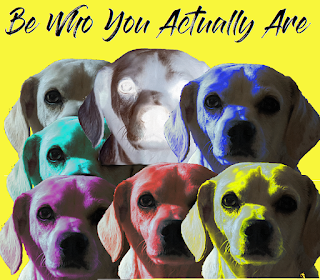Be Who You Actually Are
Many moons ago I was starting my day like many of us enjoying the gifts of dementia by spending most of it screwing up each and every thing I attempted to do, large or small and usually in ways both spectacular as well as costly. On the verge of tears I spent about an hour medicating with my very best botanicals when I had the BFO (Blinding Flash of the Obvious, engineer-speak): I am still attempting to be something that I am not only NOT but barring acts of a supreme deity, never will be again. Its just that damned simple.
* What makes a persons personality unique is the precise set of influences, patterns of thinking, lifetime experiences or memories amongst many other things. These are all stored and/or controlled by the brain.
* The root cause of dementia is damage to select portions of the brain.
* For better or worse, the simple truth is that this will result in a different person. Not better or lesser, simply different, in the same way that any two coworkers might be very different people but functionally-equivalent employees.
* Once you accept in your heart that you are different, look closely at what this new person can do.
* Challenge yourself: identify three things that you can do at least adequately well. Don’t try to find three things that you used to do that you can still sorta do; this is a fools errand.
* You will find that the things you can do now are probably completely unlike anything you did before.
In my case, before I was:
1. Software engineer/hacker
2. Cook or Chef
3. Inventor
Since the dementia has wreaked havoc on my brain and abilities, now my big three are:
1. Growing and processing quality cannabis into medications.
2. Writing
3. Photography.
What is interesting is that the latter three delve into completely different parts of the brain than the first three do. Engineering and inventing is obvious, all about facts and figures and while the Chef bit sounds like softer arts-based things, the way I did them was completely engineer-style where I had all the elements of each whittled down to a core set of rules that made everything turn out.
Note: None of the latter three were anything I had either interest or shown aptitude for prior to the dementia.
Notice the latter three, deeply into the right-brain bits. The cannabis growing is more art than science and the other two are absolutely products of imagination and whimsy.
The key take-away here is that what counts about you now very likely will have little to do with what counted about you before, so clinging to that old “you” will only end in pain because even the best hallucinations and drugs can’t bring the old “you” back. Physically impossible, Elvis has left the building.
To put this another way, you have no more chance of becoming the old “you” than you are of becoming George Clooney...or even George Washington. The longer you frame the whole equation as a binary “OldYou/NotOldYou” the longer you will be miserable. I promise.
Bottom line is, by definition the disease has changed who you are, scrambled the genetic magic that made you “you”...and the rest of that line is: You are different; not better or worse, worth more or worth less, simply different. In fact it is a known fact that when you lose a sensory input, your brain rewires itself to cause the other senses to become stronger, more pronounced and effective at perceiving and relaying data to the brain*.
At first I wasted alot of time and emotional energy crying over spilt milk but now, now I use the memory loss to as much as is practical, “forget” what I was and start every day with something that is part of me now: the grow stuff (very rewarding), writing (case in point, this document) and while I am at the grow stuff, photography. Each activity brings a reassurance that yes, Jeff is different but still worth something, he still has value.
That can be some pretty powerful mojo.
Jeff, 2020.
* Stanford University 2017:
Supersensors: How the loss of one sense impacts the others

Comments
Post a Comment